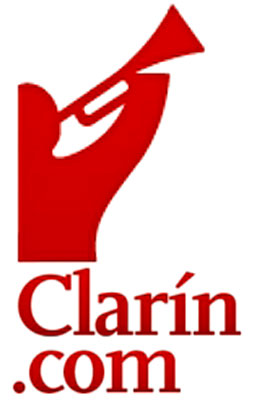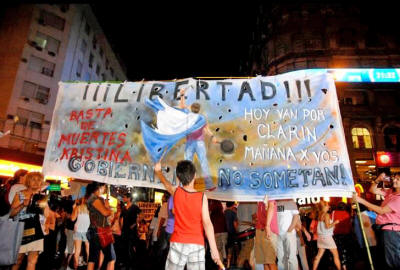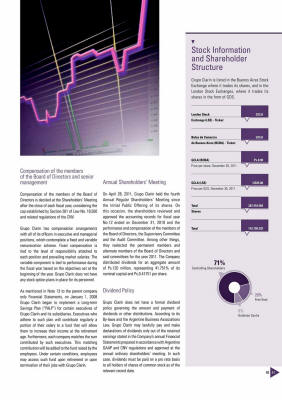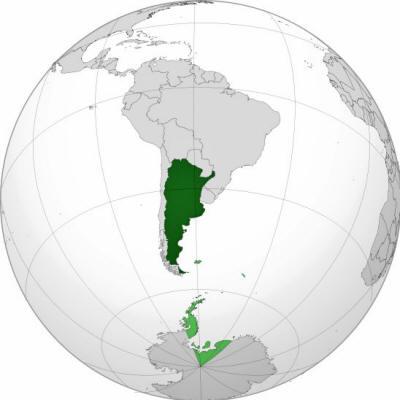
by Tony Cartalucci
November 11, 2012
from
LandDestroyer Website
Wall Street-owned media group "Clarín"
spearheading anti-government drive
in South America's Argentina.

The
US-engineered "Arab Spring" brought us the
"April
6 Youth Movement" in Egypt, run by Wall Street-backed
Mohammed ElBaradei in coordination with the Muslim Brotherhood, the
"February 17 Revolution," consisting of Al Qaeda terrorists of the
Libyan Islamic Fighting Group in Libya, and now Argentina has the "8N,"
or "November 8" movement working in coordination with foreign-owned
Argentinian media group, "Clarín."
Clarin has been
enthusiastically supporting the protesters and laying the rhetorical
groundwork justifying their street presence.
The Guardian reported in their article, "Argentina
protests - Up to half a million rally against Fernández de Kirchner,"
that,
Word of the demonstration spread through
social networks.
Many organizers remain anonymous, but
Mariana Torres, administrator of the Facebook page El Anti-K, one of the
most active in calling for the rally, said she was delighted:
"It was a
true feast for democracy."
There was no single cause of discontent. Many in the middle class are
angry at the highest inflation in a decade, estimated at a yearly 25% by
private economists, currency controls that have created a black market
in dollars, and one of the slowest economic growth rates in Latin
America.
Banners and chants also took aim at recent corruption cases and
Fernández' efforts to limit the power of big newspaper and TV
conglomerates.
Clarín, the country's most powerful media
group, has stepped up its criticism of the government before the
introduction on 7 December of a law that will weaken its empire.
Mention of the "El
Anti-K" Facebook page by the Guardian is interesting for two reasons.
First, Mariana Torres and collaborator Marcelo
Moran who created the page, have made the unlikely and unqualified claim
that they possess no affiliations whatsoever with any political
organization.
The level of support the protests have received
from special interests within Argentina
and abroad alone raise serious concerns regarding the veracity of "El
Anti-K's" claims.

Featured on the "El
Anti-K" Facebook page, this banner expresses support
for the
"Fox News" of Argentina, Grupo Clarin.
The overwhelming
support for a large, special interest media outfit,
owned by
Goldman Sachs, undermines any legitimacy the 8N movement
claims to have.
Second, while the Guardian attempts to portray
"El Anti-K" as a separate entity from Clarin, the page itself is riddled
with suspicious defenders of Clarin, with one comment even reading
(translated roughly from Spanish):
While surely any government is guilty of taking
from the people their hard earned cash and misappropriating it in a variety
of ways - to somehow claim that Clarin is simply an honest business
operating within the law to "unite human effort and capital to obtain
benefit," and that its own unwarranted influence is not a factor, is naive
at best.
Just how much unwarranted influence does Clarin
have to draw from? It is backed by one of the largest corporate-financial
institutions on Earth, Goldman Sachs.

Taken from page 40 (43
of the .pdf) of Grupo Clarín's 2011 Annual Report.
Goldman
Sachs is the largest (and only) named major shareholder of
the Clarin Group.
And as illustrated throughout the duration of
the US-engineered "Arab Spring," a corporate-financial institution like
Goldman Sachs is not a single entity operating on its own, but part of
a larger cartel of corporate-financier interests, who do not secretly
plot in smoke-filled board rooms their agenda, but fund well-known policy
think-tanks like,
-
the Brookings Institution
-
Council on Foreign Relations (CFR)
-
the American Enterprise Institute
-
the International Crisis Group (ICG)
These think-tanks in turn produce policy that is
executed by Western politicians, and talking points which are sold to the
public through the vast Western corporate media as well as local outfits
like the Clarin Group in Argentina.
US government-funded fronts like,
...build up opposition groups inside targeted nations, at times
directly funding groups when indigenous special interests are either
incapable or disinterested in collaborating with foreign special interests.
In Argentina it is clear that indigenous special interests are linked with
Western designs - just as they are in Venezuela, and
a nearly identical campaign to undermine both nations is underway.
There is a Real
Opposition in Argentina
And while the current government of Argentina is an obstacle for foreign
interests, it is by no means perfect.
According to readers from Argentina, there are
legitimate opposition groups without ties to foreign interests, or the
protesters who recently took to the streets, and in fact, are vehemently
opposed to foreign meddling in their country.
They have enumerated
grievances against the government of President Cristina Kirchner, but they
are poorly covered by local and international media.
It would benefit these groups immensely if they exposed the current protests
for what they are, and instead of holding their own protests, began pursuing
a program of pragmatic solutions to address their grievances.
The governments of both Venezuela and Argentina do employ populism. If they
did not, a Western proxy-candidate would move in and use populism to build a
pro-West "people's movement" as an unassailable voting bloc, just as
US-backed Thaksin Shinawatra
has been doing in Thailand.
Populism is a socioeconomic tool, and only as
good or as bad as the people wielding it. And like any tool, overuse has its
consequences.
The tension in Argentina is produced by the benefits of populism reaching
their limitations in the face of external pressure, sanctions, and attempts
at destabilization both political and economic.
Just as has been
pointed out in Venezuela after recent elections,
more permanent solutions must be explored, and genuine opposition groups
have an opportunity to lead the way.
Color Revolutions...
Argentina Next?
by Tony Cartalucci
November 9, 2012
from
LandDestroyer Website
Suspicion grows as Western
criticism
of Argentina's nationalization
and rebuffing of "rules of global finance"
sharpens in tandem with street
protests.
Western media agencies have begun
enthusiastically covering demonstrations in Argentina's capital, Buenos
Aires.
CNN,
AP, and the BBC have all covered the protests in equally vague terms,
failing to identify the leaders and opposition groups behind them,
while BBC
in particular recycled "Arab Spring" rhetoric claiming that,
"opposition activists used social networks
to mobilize the march, which they said was one of the biggest
anti-government protests in a decade."

The Western media claims the protesters are angry over, "rising inflation,
high levels of crime and high-profile corruption cases," all the identical,
vague grievances brought into the streets
by Wall Street-backed opposition groups in Venezuela.
Underneath these unsubstantiated claims, lies
the
International Monetary Fund, and threats of sanctions aimed at
Argentina's turning away from the US Dollar and the Wall Street-London
dominated international financial order.
And like in Venezuela, a coordinated campaign against the Argentinean
government, led by President Cristina Fernandez de Kirchner, has begun in op-eds
across the Western media.
The Chicago Tribune in an op-ed titled, "A
wrong turn in Buenos Aires - Argentina's populist economic policies court
disaster," stated:
What a shame to see a country of such great economic promise swerving
off the road to prosperity again.
The latest in a history of unforced errors
began in 2007. National elections ushered in populist President Cristina
Fernandez, who has led her nation to the brink of disaster by refusing
to play by the rules of global finance.
She restricted international trade, violated
contracts and pumped out phony data to disguise the soaring inflation
her policies brought about. All the while she scored cheap political
points by blasting the rich countries of the north for their supposed
economic imperialism.
Argentina took a grave step in May when it nationalized YPF, its main
energy company. The takeover, condemned around the world, forced out
Spain's Grupo Repsol, which owned a majority stake in YPF.
Repsol was
providing the engineering know-how and financial investment to develop
Argentina's massive energy reserves - including the huge Vaca Muerta
oil-and-gas find.
Negotiations to compensate Repsol for Argentina's asset-grab will end
badly for Argentina. The European Union is likely to impose sanctions.
Repsol wants $10 billion, and it has sent the message to rival energy
companies that it will not permit others to profit from its confiscated
assets.
Argentina will have a hard time finding
partners to help it develop what should be a lucrative resource.
The financial coup against Repsol won strong national support. The
approval ratings of Fernandez temporarily shot up. Even opposition
parties backed the move. Government officials talked about how they had
restored Argentina's dignity by standing up to foreigners exploiting its
natural bounty.
Meantime, Fernandez kept the once-hot
economy going by nationalizing private pension funds, redirecting the
money into housing loans, and expanding welfare programs by decree.
Now Argentina has to pay the price.
What is likely to follow will be coordinated
attacks including sanctions, isolation, political attacks, currency attacks,
and of course US-engineered unrest in the streets, which can range from
protesters merely clogging traffic, to escalating violence triggered by the
now
notorious "mystery gunmen" used in US unconventional warfare to
destabilize, divide, and destroy nations.
But also like in Venezuela, if enough awareness can be raised in regards to
what the West is doing, and the disingenuous intentions and interests
driving opposition groups into the streets, these efforts being used to
coerce Argentina back into the Western dominated "world order" articulated
by US think-tank policy makers
like Robert Kagan as serving,
"the needs of the United States and its
allies, which constructed it," can ultimately be thwarted.





